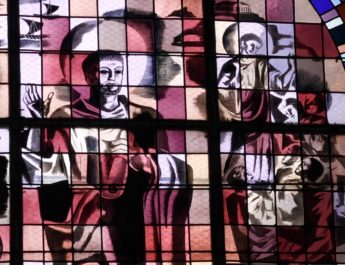Luke 19:1-10
A Women’s Lectionary – Proper 17
1 He enteredI JerichoII and was passing throughIII it.
I “entered” = eiserchomai. From eis (to, into, for, among) + erchomai (to come, go). This is to go in in a literal or figurative sense.
II “Jericho” = Hiericho. 7x in NT. From Hebrew Yriychow (Jericho); {perhaps from yareach (moon); {from the same as yerach (month)} OR from ruach (small, breathe, perceive, anticipate, accept, enjoy).}. This is Jericho, meaning either “fragrant” or “moon.”
III “passing through” = dierchomai. Related to “entered” in v1. From dia (through, across to the other side, thoroughly) + erchomai (see note I above). This is to go through, come, depart, pierce, travel, traverse.
2 IVA manV was there namedVI Zacchaeus;VII
IV {untranslated} = idou. From eido (to be aware, see, know, remember, appreciate). This is see! Lo! Behold! Look! Used to express surprise and or draw attention to the statement.
V “man” = aner. This is man, male, husband, or fellow. It can also refer to an individual.
VI “named” = onoma + kaleo. Onoma may be from ginosko (know, recognize, learn from firsthand experience). This is a name, authority, cause, character, fame, reputation. The name was thought to include something of the essence of the person so it was not thought to be separate from the person. Kaleo is related to keleuo (to command, order, direct); from kelomai (to urge on). This is to call by name, invite, to name, bid, summon, call aloud.
VII “Zacchaeus” = Zakchaios. 3x in NT– all in Luke 19. From Hebrew Zakkay (Zakkay, Zaccai, meaning “pure”); from zakak (to be bright, cleanse, transparent; to be morally pure). This is Zacchaeus, meaning “pure” or “innocent.”
he wasVIII a chief tax collectorIX and was rich.X
VIII “was” = eimi. This is to be, exist.
IX “chief tax collector” = architelones. 1x in NT. From archo (to rule, begin, have first rank or have political power) + telones (tax collector, one who worked for the Romans taking taxes from Jews; also the toll house; literally, “paying at the end”); {from telos (an end, aim, purpose, completion, end goal, consummation, tax; going through the steps to complete a stage or phase and then moving on to the next one)}. This is the head or main tax collector.
X “rich” = plousios. From ploutos (abundance, wealth, or riches; money, possessions, spiritual abundance, or a valuable bestowment); from polus (much, many, abundant) OR pleo (to sail, voyage); {probably from pluno (to plunge – so to wash); from pluo (to flow)} OR pletho (to fill, accomplish, supply; to fill to maximum capacity). This is wealthy, having full resources. It can be a rich person or refer to God’s abundance.
3 He was tryingXI to seeXII who JesusXIII was,
XI “trying” = zeteo. This is to seek, search for, desire. It is searching for something by inquiring or investigation. It can be seek in a literal or figurative sense. There is a Hebrew figure of speech “to seek God’s face” so it can also mean to worship God. Alternately, you could seek someone’s life i.e. plot to kill them.
XII “see” = horao. To see, perceive, attend to, look upon, experience. Properly, to stare at and so implying clear discernment. This, by extension, would indicate attending to what was seen and learned. This is to see, often with a metaphorical sense. Can include inward spiritual seeing.
XIII “Jesus” = Iesous. From Hebrew Yehoshua (Joshua, the Lord is salvation); {from YHVH (proper name of the God of Israel; the self-existent and eternal one); {from havah (to become) or from hayah (to come to pass, become, be)} + yasha (to deliver, defend, help, preserve, rescue; properly, to be open, wide or free, which implies being safe. So, in a causative sense, this is to free someone)}. This is Jesus or Joshua in Greek – the Lord saves or the Lord is salvation.
but on account of the crowdXIV he couldXV not, because he was shortXVI in stature.XVII
XIV “crowd” = ochlos. Perhaps from echo (to have, hold, possess). This is a crowd, the common people, a rabble. Figuratively, it can refer to a riot.
XV “could” = dunamai. This is to be able, or something that is possible. It can also be empowered or being powerful. The Greek word for “miracle” (dunamis) comes from this root.
XVI “short” = mikros. This is small in reference to a size or the number of something, least or less. Figuratively, it can refer to little dignity.
XVII “stature” = helikia. 8x in NT. From the same as helikos (of what size, how much; properly, full grown, an adult); from helix (mature, adult, of the same age). This refers to maturity, stature, life span, or being of a suitable age. It could refer to maturity in terms of years or size.
4 So he ranXVIII ahead and climbedXIX a sycamore treeXX to see him, because he was going toXXI pass that way.XXII
XVIII “ran” = protrecho. 2x in NT. From pro (before, ahead, earlier than, above) + trecho (to run, make progress, rush; running like an athlete in a race; figuratively, to work quickly towards a goal in a focused way). This is to run ahead or outrun.
XIX “climbed” = anabaino. From ana (up, back, among, again, anew) + the same as basis (step, hence foot; a pace); {from baino (to walk, to go)}. This is to come up in a literal or figurative sense – ascent, rise, climb, enter.
XX “sycamore tree” = sukomorea. 1x in NT. From sukon (fig) + moron (black mulberry). This is a sycamore or fig-mulberry tree.
XXI “was going to” = mello. Perhaps from melo (something that one is worried or concerned about, something one pays attention to or thinks about). Properly, this is ready, about to happen, to intend, delay, or linger. This is just on the point of acting.
XXII “pass that way” = dierchomai. Same as “passing through” in v1. See note III above.
5 When Jesus cameXXIII to the place,XXIV he looked upXXV and said to him, “Zacchaeus, hurryXXVI and come down,XXVII
XXIII “came” = erchomai. Related to “entered” and “passing through” in v1. See note I above.
XXIV “place” = topos. This is a place or region. It is a smaller space that can only hold a limited number of people whereas chora is a larger place. Figuratively it could be an opportunity.
XXV “looked up” = anablepo. From ana (up, back, again, among, between, anew) + blepo (to see, used primarily in the physical sense; figuratively, seeing, which includes attention and so to watchfulness, being observant, perceiving, beware, and acting on the visual information). This is to look up or regain sight.
XXVI “hurry” = speudo. 6x in NT– shepherds went with hast to find Mary and Joseph and the child in Luke 2:16. Jesus tells Zacchaeus to hurry down from the tree in Luke 19:5-6. Perhaps from pous (foot in a figurative or literal sense). This is to hurry, urge on, await. It implies eagerness or diligence.
XXVII “come down” = katabaino. Related to “climbed” in v4. From kata (down, against, throughout, among) + baino (see note XIX above). This is to come down whether from the sky to the ground or from higher ground to lower. It can be used in a literal or figurative sense.
for I mustXXVIII stayXXIX at your houseXXX today.”XXXI
XXVIII “must” = dei. From deo (to tie, bind, compel; declare unlawful). This is what is necessary or proper. It is what is needed or what one should do – a duty or something inevitable. This refers to something absolutely necessary.
XXIX “stay” = meno. This is to stay, remain, wait, await, continue, abide, endure. It can mean to literally stay in a place or to remain in a condition or to continue with hope and expectation.
XXX “house” = oikos. This is house – the building, the household, the family, descendants, the temple.
XXXI “today” = semeron. From hemera (day, time, daybreak); perhaps from hemai (to sit). This is today, now, at present.
6 So he hurried downXXXII and was happyXXXIII to welcomeXXXIV him.
XXXII “down” = katabaino. Same as “come down” in v5. See note XXVII above.
XXXIII “was happy” = chairo. From char– (to extend favor, lean towards, be inclined to be favorable towards). This is to rejoice, be glad or cheerful; a greeting. This is the root verb that the Greek word for “grace” comes from (charis).
XXXIV “welcome” = hupodechomai. 4x in NT– including Martha and Zacchaeus welcoming Jesus into their homes in Luke 10:38 & Luke 19:6. From hupo (by, under, about, subordinate to) + dechomai (to warmly receive, be ready for what is offered, take, accept, or welcome; to receive in a literal or figurative sense). This is to welcome someone as a guest, to entertain them, to have someone in your personal care.
7 AllXXXV who saw it began to grumbleXXXVI and said,XXXVII
XXXV “all” = pas. This is all or every.
XXXVI “grumble” = diagogguzo. 2x in NT– grumbling of Pharisees and scribes before the Parable of the Lost Sheep in Luke 15:2 & when Jesus agreed to eat with Zacchaeus in Luke 19:7. From dia (through, for the sake of, across, thoroughly) + gogguzo (to murmur or grumble; an onomatopoeia to sound similar to the cooing of doves; figuratively, it is simmering displeasure that is muffled – a dull, constant murmuring). This is to grumble or murmur like the ongoing hum of a dove or bee. It is intense, negative complaining as amplified through a crowd.
XXXVII “said” = lego. This is to speak, say, name, call, command. It is generally to convey verbally.
“He has goneXXXVIII to be the guest ofXXXIX oneXL who is a sinner.”XLI
XXXVIII “gone” = eiserchomai. Same as “entered” in v1. See note I above.
XXXIX “to be the guest of” = kataluo. 17x in NT. From kata (down, against, throughout, among) + luo (to loose, release, untie; figuratively, to break, destroy, or annul; releasing what had been withheld). Literally, this means thoroughly loosening. It can mean unharnessing or unyoking animals and so to lodge somewhere for a night. It can also mean to disintegrate or demolish in a literal or figurative sense. So, it can be destroy, overthrow, abolish, or tear down.
XL “one” = aner. Same as “man” in v2. See note V above.
XLI “sinner” = hamartolos. From hamartano (to miss the mark, do wrong, make a mistake, sin); {from a (not) + meros (a part or share)}. This is sinning, sinful, sinner. It referred to missing the mark or falling short. The term was also used in archery for missing the target.
8 Zacchaeus stoodXLII there and said to the Lord,XLIII “Look,XLIV half of my possessions,XLV
XLII “stood” = histemi. This is to stand, place, establish, appoint, stand ready, be steadfast.
XLIII “Lord” = Kurios. From kuros (authority, supremacy). This is a respectful address meaning master or sir. It refers to one who has control or power greater than one’s own. So, it was also applied to God and Jesus as Master or Lord.
XLIV “look” = idou. Same as {untranslated} in v2. See note IV above.
XLV “possessions” = huparcho. Related to “chief tax collector” in v2. From hupo (by, under, about, subordinate to) + archo (see note IX above). This is to begin or be ready, to exist or possess. It is what one already has or possesses.
Lord, I will giveXLVI to the poor,XLVII and if I have defraudedXLVIII anyone of anything, I will pay backXLIX four times as much.”L
XLVI “give” = didomi. To give, offer, place, bestow, deliver. This is give in a literal or figurative sense.
XLVII “poor” = ptochos. From ptosso (to crouch or cower as a beggar does). This is poor or destitute – someone who is extremely poor and bowed down because of a long struggle under poverty. Properly, it means bent over so figuratively it is someone who is deeply destitute and lacking tangible resources. This is a beggar – as extremely opposite a wealthy person as possible.
XLVIII “defrauded” = sukophanteo. Related to “sycamore tree” in v4. 2x in NT. From sukon (see note XX above) + phaino (to bring light, cause to appear, shine, become visible or clear). This is literally someone who was an informant against people who illegally exported figs from Greece. Figuratively, it is to make a false accusation or defraud. This is where the word “sycophant” comes from.
XLIX “pay back” = apodidomi. Related to “give” in v8. From apo (from, away from) + didomi (see note XLVI above). This is to give back, return, give away. It is to restore as when one makes payment – to rend what is due, to sell.
L “four times as much” = tetraplous. Related to “rich” in v2. 1x in NT. From tessares (four; figuratively, total coverage) + perhaps ploos (voyage, navigation)}; {from pleo (to sail, voyage); probably from pluno (to plunge – so to wash); from pluo (to flow)} OR from tessares (four; figuratively, total coverage) + a derivative of pleistos (greatest, large quantity); {from polus (see note X above)}. This is quadruple or fourfold.
9 Then Jesus said to him, “Today salvationLI has comeLII to this house, because he, too, is a sonLIII of Abraham.LIV
LI “salvation” = soteria. From soter (a savior, deliverer); from sozo (to save, heal, preserve, or rescue; taking someone from danger to safety; delivering or protecting literally or figuratively); from sos (safe, rescued, well). This is deliverance, salvation, preservation, welfare, prosperity, safety.
LII “come” = ginomai. This is to come into being, to happen, become, be born. It can be to emerge from one state or condition to another or is coming into being with the sense of movement or growth.
LIII “son” = huios. This is son, descendant – a son whether natural born or adopted. It can be used figuratively for other forms of kinship.
LIV “Abraham” = Abraam. From Hebrew Abraham (exalted father); from the same as Abiram (exalted father, a high father – lofty) {from ab (father literal or figurative) + rum (rise, bring up, being high, extol, exalt, haughty; to raise in a literal or figurative sense)}. This is Abraham, father of many nations or father of a multitude.
10 For the Son of ManLV cameLVI to seek outLVII and to saveLVIII the lost.”LIX
LV “Man” = anthropos. Related to “man” in v2 & “see” in v3. Probably from aner (see note V above) + ops (eye, face); {from optanomai (to appear, be seen); perhaps from horao (see note XII above)}. This is human, humankind. Used for all genders.
LVI “came” = erchomai. Same as “came” in v5. See note XXIII above.
LVII “seek out” = zeteo. Same as “trying” in v3. See note XI above.
LVIII “save” = sozo. Related to “salvation” in v9. See note LI above.
LIX “lost” = apollumi. From apo (from, away from) + ollumi (to destroy or ruin; the loss that comes from a major ruination). This is to destroy, cut off, to perish – perhaps violently. It can also mean to cancel or remove.
Image credit: “The Parable of the Talents” by Jan Frearks van der Bij, 1962. Photo by Ytzen, 2013.




